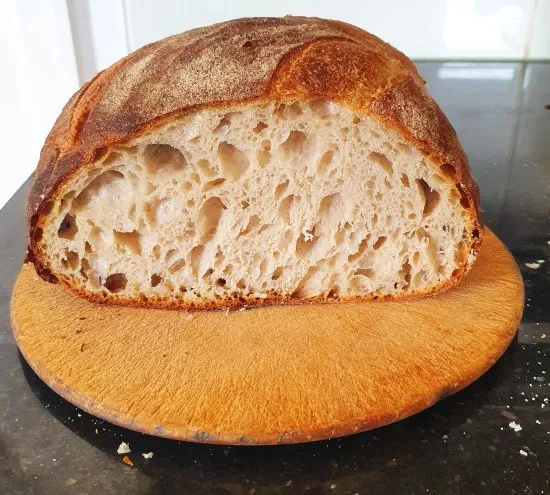
My Rus-ian bread journey
I've always been interested in Yippee's posts about CLAS and I've done a couple of CLAS bakes with good results. Most of the detail on CLAS is to be found on Rusbrot's blog and in his YouTube videos. What caught my eye recently was his post about Russian Monastery bread. This is presented as a rye/wheat bread made with a custom built starter. The starter is made with coarsely crushed rye malt and raisins, followed by a rye flour build, so I'm guessing it is a composite of a raisin yeast water and sourdough. I didn't have any rye malt, but Rus suggests you can use coarsely crushed rye grain and malt extract instead, so I ordered some malt extract, but it never came. Back to plan A mkII - make my own rye malt! This is the guide I followed, but much simplified as I was only making 200g. A few days later it was ready and I kicked off my Monastery bread build.
I followed Rus's process to make a rye/wheat Mischbrot. All went OK and I ended up with an OK bake. It was a bit solid, (like all my rye bread is!) and had a lot of cracks in the crust - not sure why.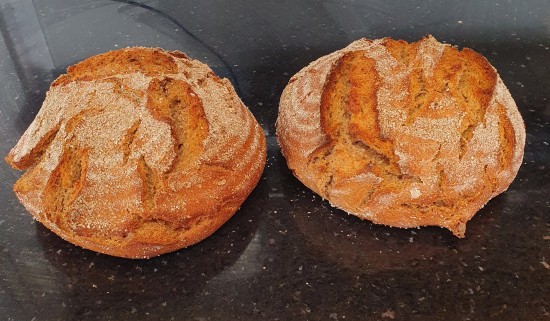
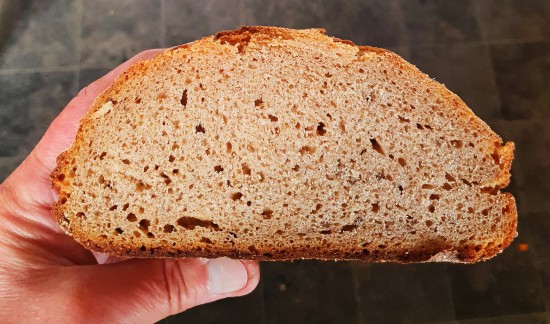
After this, things got more interesting. Rus suggests that you can save some of the dough to make a ripe dough starter - pate fermentee, I guess. So I did this and used it to make a high extraction wheat flour big boule.
Levain build 1
10g rye malt coarsely crushed
10g Red Lammas wheat grain coarsely crushed
10g BF
10g Red Lammas flour
12g ripe dough
40g water
5 hrs 28C
Levain build 2
10g levain build 1
100g WW flour sieved
75g water
12hrs 25C
Main dough
200g WW flour #40
200g WW flour #50
100g Manitoba flour
350g water
autolyse 20m
106g lev build 2
10g salt
mix, 2 folds
3 hrs 45m bulk
NB: remove 70g dough as a ripe dough starter and store in frij
shape to one big boule
FP 1hr 10m
And what a great bake it turned out to be! Super oven spring, good loft, nice open and moist crumb
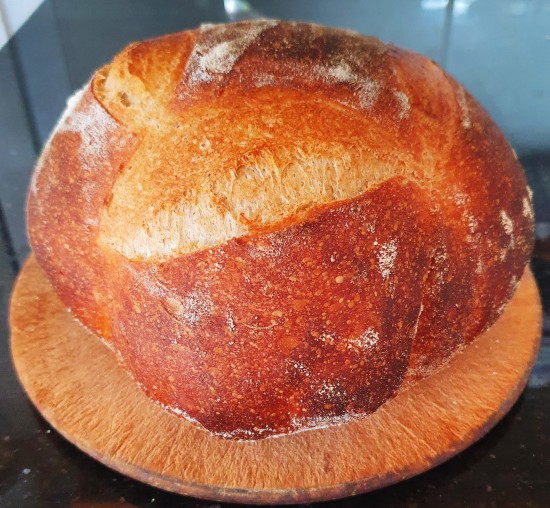
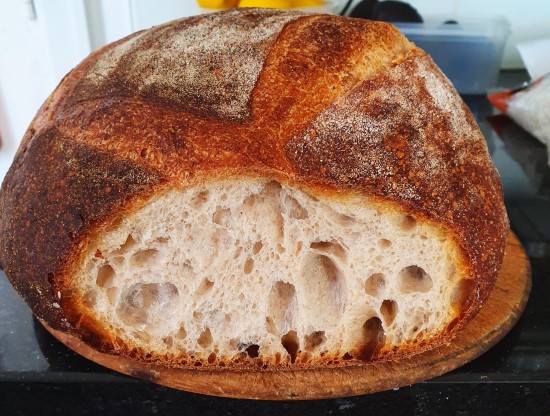
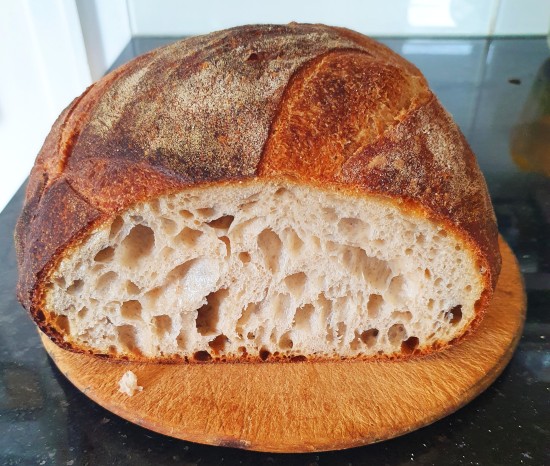
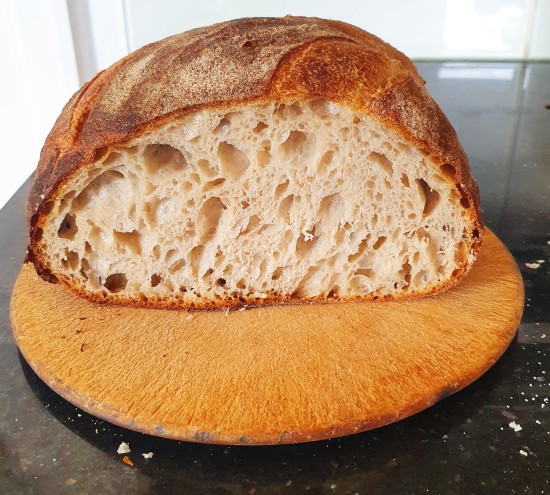
Just to make sure this bake wasn't a fluke, I did a similar bake, but to two small boules and one tubby batard again nice looking loaves:
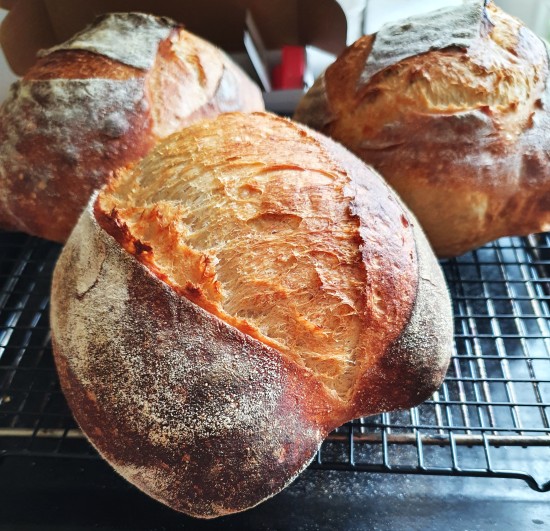
So go on - why not give it a try! If you have a proofing box, you are good to go!
Lance
- albacore's Blog
- Log in or register to post comments
That transformation is really amazing.
Would you mind if I featured this on the homepage for a bit?
Thanks Floyd - I would appreciate that very much!
Lance
Wow, that is quite amazing Lance, very impressive bread. So other than getting certain ingredients did you find the CLAS otherwise challenging? Can you taste the LAB component in the baked bread, would you think it was sourdough if you didn’t know?
Benny
Thanks Benny, I found it very easy to make the initial starter (build 1). You can coarsely grind the malt in a blade spice grinder. I also replaced some of the malt with rye grain as I did wonder how much yeast and bacteria would be present on freshly roasted malt. Lastly, I used raw, unfiltered cider vinegar - for good measure!
Then just let it sit for 48 hrs with the occasional stir - so low maintenance
The later build of the starter (build 2) for the fluffy loaf was pretty much out of my own head.
I would say that there is some lactic sour, but not as much as a standard SD. My SD tends to mild anyway, so not too much difference. In Rus's blog, he talks about getting the starter nice and sour, which I did for build 1, but maybe not build 2 - so there is probably scope to add more sour by fermenting initial build 2 longer, if wanted.
Lance
Looks really good Lance. I like the red hued crust and the wild crumb.
Thanks for the information, I enjoyed reading the recipe from rus brot including some of the things he said which compare bread making and sourdough of times gone by and today. I very much share his opinion in that regard. This approach runs along the lines of the "bran starter" I was working on with DanAyo.
Today we might forget that bread was once made out of necessity and if a piece of the leavened dough was kept in storage it would then become sourdough / soured-dough which could be used as a starter for the next batch, i.e. a continuous old-dough process.
Great bake!
Michael
Thanks Michael; I guess I always like to experiment with processes and ingredients that are a little different from the norm, just by way of a change.
The only trouble is that you end up with another starter to look after!
Lance
I wonder how come the crumb looks so white, with all that rye and WW flour in the recipe? What are your thoughts on that? Also, could you please let us know how you baked it - temperatures and times? Appreciate it!
Thanks Cooper. The wholegrain flours were sifted through #40 or #50 sieves, producing high extraction flours, hence the fairly light coloured crumb.
I bake in a domestic oven with a bake stone and externally produced (pressure cooker) piped in steam. I heat the oven up to 250C with top and bottom heat. I turn it down to 225C bottom heat only and then put the loaves in after presteaming. Once the loaves are in I steam for 10 secs, bake for 20 min, then vent the steam and bake for another 20 mins with top and bottom heat.
Lance
to the blog about rye bread recipes. Interesting reading, although I found the style of writing to be very condescending. The author talks about the "old Russian" approach as the only correct way to make rye breads, and makes some snide remarks about American and Australian recipes, calling them wasteful and their authors "amateurs". I found the overall tone to be a bit off-color, to the point that it turned me off from reading the rest of his recipes. :-(
I agree, his remarks on this subject are uncalled for and I was rather surprised to read them. Even some of the commenters on his blog did not agree with them. There is no need for conflict within the breadmaking community and "The Fresh Loaf" is a great example of that.
Lance
They seem to be in Russian... Is there an english version?
No - the best thing is to open the links in Google's Chrome browser and it will offer to translate for you. Or, if it opens in Russian, just right click on a blank area of the page and select translate.
I normally use Firefox, but have to reluctantly admit that Chrome has a better translation ability.
Lance
Not for the sake of argument, just to be honest and fair, found nothing about the superiority of "old Russian" breadmaking in his blog. What he warns the (mostly Russian) readers of his blog against though is relying too much on rye bread recipes from translated "American and Australian" books. Makes perfect sense if one craves for traditional rye sour bread considering that the historical centers of rye cultivation and rye baking are in countries around the Baltic Sea.
I assume you read it in translation? I read the original (it's my native tongue), and what I was referring to is the overall tone, the feeling one gets while reading that text. Take, for example, the following phrase: " К тому же американцы или австралийцы, а именно их книги переводили и переводят на русский язык, в выпечке ржаного хлеба мягко сказать дилетанты, так что следовать их советам будет делом ошибочным." Translation (mine): "By the way, Americans and Australians, whose books have been are are being translated to Russian, are amateurs in the baking of rye bread, to put it mildly, and following their advice would be a mistake".
In so saying, the author is either intentionally ignoring or is simply ignorant of the fact that countless immigrants of European origin have come to those countries in the past, and that it's they who are mainly continuing the tradition of rye baking. Anyway, the tone of his writing should not deter us from using the recipes, if they are good and make tasty bread.
Happy baking!
This loaf looks incredible and something I want to make on my next baking day! (Along with all the other loaves I want to make….)
I did want to pass on that unbaked dough freezes nicely for a couple of months, allowing you to have an old dough process at your leisure! I usually freeze a walnut sized piece in an oiled ziploc.
Hello to everyone. I am happy that your experience was successful. What are great looking loaves!!!
I am a rye bread baker. I've baked Monastery bread following Rus brot's recipe several times. It is not my favorite method of baking rye bread. Rus brot's name is Andrei. He is a great guy. I appreciate his altruism and curious mind. He always answers all my questions with respect. You were lucky that you didn't end up with Brettanomyces wild yeast when you started a new starter following his recipe. Many times I had to start over from the beginning because I noticed Brett yeast overgrowth on my new rye starters on the 3rd or 4th day. I just discarded the failed ones. Unfortunately, Brettanomyces yeast comes from rye malt. Andrei recommended to add more vinegar in the starter. In one of my attempts to grow a new starter I had a surprise - a new vinegar mother growth. I couldn't even imagine that simply adding Bragg apple cider vinegar to suppress the bad flora in my rye starter, would lead to a new vinegar mother growth. It means that Bragg apple cider vinegar with mother was really alive and active. I couldn't believe my own eyes. This creature completely stopped all activity in the starter and was feeding on resins. After that discovery I started using pasteurized white vinegar. Lesson learned! Brettanomyces wild yeast is like an unwanted pest in a new starter. It doesn't make good bread. However, it produces wonderful, unforgettable, complex and floral aromas.
Now I make kvass (liquid starter) following recipes from old Russian books written in the 17th and 19th century and bake 100% rye bread. I love rye bread. I find rye bread more aromatic and tastier than wheat bread. God forbid to have Brettanomyces yeast in rye kvass. This monster will completely stop LAB and yeast fermentation and start converting kvass into a sour vinegar.
Thank you for your comments. I understand what you are saying about the vinegar with mother - probably not a good idea in hindsight!
TBH, I haven't used the monastery starter since I made this bread; I think it probably was more of a yeast water starter than a mixed sourdough one, at least the way I made it.
Your bread looks good; I'm sure if you would care to share your method of kvass starter creation and your bread recipe then the TFL community would love to see it - and perhaps have a go at making it!
Lance